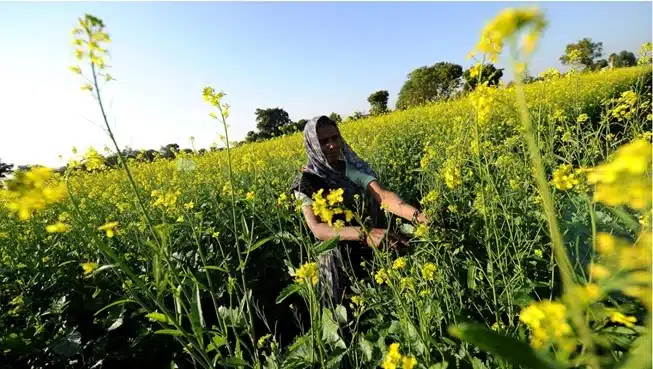What’s in today’s article?
- Why in news?
- What is GM Crop?
- Legal position of genetically modified crops in India
- Background: Ban on commercial release of GM crops will be against national interest
- News Summary: Ban on commercial release of GM crops will be against national interest
- Stand of govt in SC
Why in news?
- The Supreme Court has reserved its judgment on public interest litigations (PILs) challenging the government’s decision to allow the commercial release of the GM mustard variant Dhara Mustard Hybrid-11 (DMH-11).
GM Crop
- Conventional plant breeding involves crossing species of the same genus to provide the offspring with the desired traits of both parents.
- Genetic engineering aims to transcend the genus barrier by introducing an alien gene in the seeds to get the desired effects.
- The alien gene could be from a plant, an animal or even a soil bacterium.
- E.g. Bt cotton has alien genes from soil bacterium Bacillus thuringiensis (Bt).
- It allows the crop to develop a protein, toxic to the common pest pink bollworm.
- In Bt brinjal, a gene allows the plant to resist attacks of fruit and shoot borer.
- Seeds produced using genetic engineering are called Genetically Modified Seeds.
Legal position of genetically modified crops in India
- In India, the Genetic Engineering Appraisal Committee (GEAC) is the apex body that allows for commercial release of GM crops.
- In 2002, the GEAC had allowed the commercial release of Bt cotton.
- Use of the unapproved GM variant can attract a jail term of 5 years and fine of Rs 1 lakh under the Environmental Protection Act ,1989.
Background: Ban on commercial release of GM crops will be against national interest
- Earlier, in 2017, GEAC had cleared the proposal for commercial cultivation of GM mustard. However, the Union Environment Ministry vetoed it and suggested that the panel hold more studies on the GM crop.
- In October 2022, GEAC again cleared the proposal for commercial cultivation of GM mustard – also known as DMH-11.
- Later, the petitioners, Gene Campaign and activist Aruna Rodrigues, challenged the government move to commercially release DMH-11.
News Summary: Ban on commercial release of GM crops will be against national interest
- The government told the Supreme Court that India already brings in and uses oil made from GM crops.
- It stated that opposition to this technology, based on groundless fears of negative effects, harms farmers, consumers, and industry.
Stand of govt. in SC
- Production increased and so has consumption
- A total of 272.2 lakh hectares was under cultivation of oilseeds in 2010-11, this increased to 302.3 lakh hectares in 2022-23.
- The average per capita oil consumption had also risen from 2.9 kg per year in 1950-1960 to 19.5 kg per year in 2022.
- Increasing demand for edible oil
- In 2020-21, 13.45 million tonnes (54%) of the total edible oil demand was met through import worth about ₹1,15,000 crore.
- This included palm oil (57%), soybean oil (22%), sunflower oil (15%) and small quantity of canola quality mustard oil.
- In 2022-23, 15.533 million tonnes (55.76%) of the total edible oil demand was met through import.
- In 2020-21, 13.45 million tonnes (54%) of the total edible oil demand was met through import worth about ₹1,15,000 crore.
- Critical for food security of India
- Mustard is the most important edible oil and seed meal crop of India.
- Strengthening of plant breeding programmes, including use of new genetic technologies such as GE technology is critical for meeting emerging challenges in Indian agriculture.
- This is also vital for ensuring food security while reducing foreign dependency.
- India is already importing & consuming a large quantity of edible oil from GM oilseeds
- India imports about 55,000 MT of canola oil largely from GM canola seeds.
- Similarly, nearly 2.8 lakh tonnes of soybean oil is being imported annually largely comprising GM soybean oil.
- Most exporting countries such as Argentina, US, Brazil, and Canada cultivate GM soybean.
- Economic losses of crops due to weeds
- The govt said India’s annual economic losses of crops due to weeds is $11 billion (Rs 1 lakh crore).
- It also highlighted that annual value of herbicide currently used in India is Rs 4,500 crore even without Herbicide Tolerant (HT) crops.
- HT crops provide effective weed control and it will be detrimental to ban development of HT crops for Indian agriculture as labour is expensive and not available.
- DMH-11 hybrid has shown increased per-hectare yield by 25-30% over the traditional varieties
- It further added that mustard is one of the highest oil-bearing of oilseeds in India. Hence, domestic production of edible oils will rise considerably.
Q1) What is Dhara Mustard Hybrid-11?
Dhara Mustard Hybrid-11 (DMH-11) is a genetically modified (GM) hybrid variety of the mustard species Brassica juncea. DMH-11 is a genetically modified variant of Herbicide Tolerant (HT) mustard. It was developed using the genetic male sterility (GMS) technique, especially the “barstar-barnase” system, to make it herbicide resistant.
Q2) What is Genetic engineering?
Genetic engineering, also known as genetic modification, is a set of technologies that alters the genetic makeup of cells. It involves cutting and joining genetic material from different species to create new combinations of heritable genetic material.
Source: Ban on commercial release of GM crops will be against national interest, Centre tells SC | The Hindu
Last updated on June, 2025
→ UPSC Notification 2025 was released on 22nd January 2025.
→ UPSC Prelims Result 2025 is out now for the CSE held on 25 May 2025.
→ UPSC Prelims Question Paper 2025 and Unofficial Prelims Answer Key 2025 are available now.
→ UPSC Calendar 2026 is released on 15th May, 2025.
→ The UPSC Vacancy 2025 were released 1129, out of which 979 were for UPSC CSE and remaining 150 are for UPSC IFoS.
→ UPSC Mains 2025 will be conducted on 22nd August 2025.
→ UPSC Prelims 2026 will be conducted on 24th May, 2026 & UPSC Mains 2026 will be conducted on 21st August 2026.
→ The UPSC Selection Process is of 3 stages-Prelims, Mains and Interview.
→ UPSC Result 2024 is released with latest UPSC Marksheet 2024. Check Now!
→ UPSC Toppers List 2024 is released now. Shakti Dubey is UPSC AIR 1 2024 Topper.
→ Also check Best IAS Coaching in Delhi






















